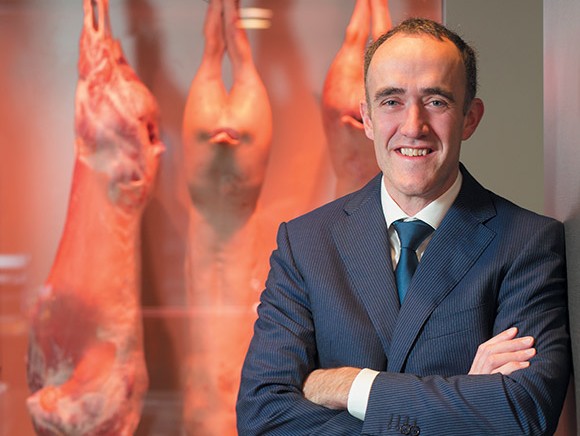
Rabobank Foodzone is an online platform for experts, business people and stakeholders from the food supply chain. Hans van Haaren, Sector Manager Food at Rabobank, is in charge of the platform. He publishes news, updates and opinions on the latest developments in the food sector and invites reactions from the industry.
His analysis on Foodzone is clear and well-informed, astute and though-provoking – but never negative, because that’s simply not his style. “Don’t let yourself be blinded by threats!” he says. “Instead, it’s better to look where the opportunities are.” That positive attitude is essential for Van Haaren, which is why in this interview we are focusing on business opportunities in the food chain.
“I want to trigger people, change their perspective in terms of how they look at the chain,” he says enthusiastically. And then he becomes more earnest: “And I think that we need to do that urgently because the food supply chain is still fairly conservative. I try to stimulate companies to take a closer look at their business model; it should be critically reviewed at least every 7 years. I like short lines of communication and direct customer contact. It’s my dream to turn Foodzone into a truly interactive platform.”
“The pressure on the world food supply is a global issue that we can’t ignore. By 2050 we will have nine billion mouths to feed worldwide. I’m convinced that consumption and production should preferably be located close together. There are currently far too many logistics movements involving food around the world and that really must change. There might be some short-term benefit in a Dutch grower exporting tomatoes from the Netherlands to China, but why shouldn’t a Chinese grower be able to produce his own tomatoes?”
“While it’s a challenge to feed the world’s population on a global level, today’s reality is that there is overproduction of food in north-western Europe. This presents entrepreneurs with a dilemma. It means making decisions and knowing who your end consumer is – who are you producing for? Profits are slim in the whole chain, combined with tight constraints. Food retailers’ purchasing organisations place huge pressure on suppliers, who also have to meet a lot of requirements in terms of quality, sustainability, traceability, etc. Producers are being pushed right to the edge. Therefore, I believe that the retail purchasing organisations should shoulder more of the responsibility,” comments Hans. “And so too should consumers by the way; they are acting very pampered. They should realise that in the Netherlands we have the best food offering: high quality and availability for everyone at a very competitive price. That’s thanks to the efforts of the entire food chain.”
“Consumers say that they want small-scale production, transparency and sustainability,” continues the banker, “but the facts show that they aren’t willing to pay for it. That consumer attitude really has to change! It would be a step in the right direction if the retail purchasing organisations would base their decisions about which products to list on other factors in addition to price; if they would consider animal welfare, for example, or less use of antibiotics or pesticides. In Europe we should also produce less, but of a higher quality. And then we should all pay a fair price for the products.”
“In the Netherlands, I think we should place a lot more emphasis on marketing our knowledge. We’re still a very big exporter of products. The Netherlands is one of the most productive and most efficient food producing nations in the world. We lead the way in reinvention, innovation and food quality; we have Wageningen University, the Friesland Campina Innovation Center, Food Valley... We know how to produce pork chops extremely efficiently, how to grow vegetables in multi-storey car parks, and we have a very finely meshed distribution network – that’s another area we excel in. We can export all those innovations to parts of the world where the demand for food is increasing. I also see opportunities in the export of high-quality food products. Just think of a product like Nutrilon infant formula – to produce that requires a lot of expertise.”
“Collaboration and far-reaching chain integration also offer chances. Romanticising food will not provide any sector with a strong long-term foundation. Taking concrete action will. One nice example is ‘Dutch Cuisine’, a collaborative partnership between companies, NGOs (non-governmental organisations, Ed.) and the government. We are also involved in this as Rabobank. We and 14 other stakeholders have joined forces in the Green Deal ‘Making Food Consumption More Sustainable’. One of the topics is protein transition. Our shared mission is to put sustainable Dutch cuisine and eating habits on the map for a large audience, both nationally and internationally. This Green Deal entails us working together with each and every link in the food chain. It’s a good example of taking a positive approach.”

“You bet! One development I find very exciting is that we’re seeing a growing number of new players throughout the chain, including many new entrants to the sector. These companies often have no previous link to food, but instead have extensive knowledge of logistics, distribution or data processing, for instance. Everything about us can be deduced from our shopping basket: our income, preferences, family situation, brand loyalty and product combinations. It’s not inconceivable that an organisation like Amazon, Google or a new market entrant could start to offer groceries at – or even below – cost price in order to make its profit from selling consumer data to all manner of suppliers. Another example is Phillips, which suddenly has plans to get involved in the production of fruit and vegetables – because it has a lot of knowledge about light. Companies from outside the industry often have a much more refreshing view of the chain than the traditional players. And that’s no bad thing in my opinion; it fosters innovation and keeps everyone on their toes.”
Source: Foto Hans van Haaren: ©KNS; Foto geldstapelen: ©Andrey_Popov/Shutterstock.com